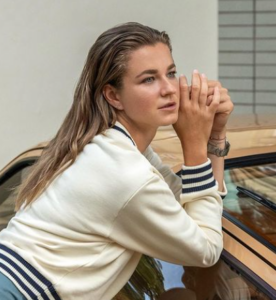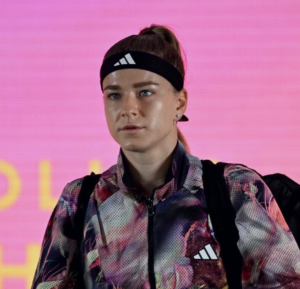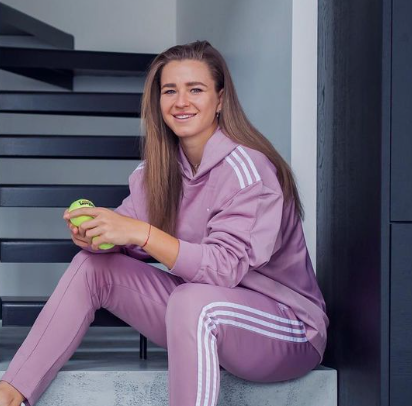Chris Evert’s apology and the ensuing conversation serve as an important lesson in perception and the power of words
While her intentions were likely to praise Karolina Muchova, the way in which the comparison was framed inadvertently touched on deep-seated issues related to gender in sports.
Ons Jabeur’s response, and the broader reaction it sparked, highlight the ongoing need to challenge stereotypes and celebrate athletes for their unique contributions, rather than through the lens of gender-based comparisons.
As tennis moves forward, it is hoped that this incident will lead to more thoughtful and inclusive commentary, where athletes like Muchova and Jabeur are celebrated not for how they compare to male players, but for their own extraordinary talents and achievements on the court.
Moreover, this incident serves as a reminder that words matter, especially in a global sport like tennis, where comments made by influential figures can have far-reaching implications.
As the sports world continues to evolve and push for greater equality, it is crucial to be mindful of the language used to describe and praise athletes, ensuring that it uplifts and empowers rather than diminishes.

Also Read: Who Is Karolina Muchova (Tennis Player) Coach? Meet David Kotyza and Wikipedia Explored
Table of Contents
Chris Evert: Controversial Commentary
The Incident at the 2024 US Open
During the 2024 US Open, an incident involving tennis legend Chris Evert sparked significant debate in the sports world.1
Evert, an 18-time Grand Slam champion and respected commentator, made a comparison that was intended to be complimentary but ended up causing controversy.
During Karolina Muchova’s second-round match against Naomi Osaka, Evert likened Muchova’s style of play to that of male tennis players, praising her for her “bigger serves, volleys, and superior movements.”
However, this comment, intended to highlight Muchova’s athleticism and skill, was met with backlash, particularly from Tunisian tennis star Ons Jabeur.
Thank you for having me Palermo🍦🇮🇹
Taking all the positives from this week and let’s keep on rolling 🦾💛
📍 Next stop, the Olympics! pic.twitter.com/dwHSj5AzNO— Karolina Muchova (@karomuchova7) July 22, 2024
The Gender Stereotyping Debate
Jabeur’s reaction opened up a broader conversation about gender stereotyping in sports, particularly in tennis. The comparison of female athletes to their male counterparts is not a new phenomenon.
It is often seen as a way to praise the athleticism and skill of women, but it also implies that male athletes are the standard against which all others should be measured.
This mindset reinforces the idea that men’s sports are superior, even if unintentionally, and diminishes the accomplishments of female athletes by suggesting that their abilities are remarkable only when they resemble those of men.
Jabeur’s stance resonated with many in the sports community who feel that such comparisons undermine the unique strengths and styles that female athletes bring to their respective sports.
Tennis, in particular, has a rich history of women who have revolutionized the game with their distinct playing styles—players like Martina Navratilova, Serena Williams, and Steffi Graf, who have all brought something new and powerful to the court without needing comparisons to their male counterparts.

Karolina Muchova: Journey to the 2024 US Open
- Before delving deeper into the controversy, it’s essential to understand the context surrounding Karolina Muchova’s performance at the 2024 US Open.2
- Muchova, who had been steadily rising in the ranks, entered the tournament with determination.
- Prior to the US Open, she participated in the 2024 Cincinnati Open, where she showcased her talent by defeating Dayana Yastremska in the first round.
- However, she was halted by eventual runner-up Jessica Pegula in the second round. Despite this setback, Muchova remained focused and started her US Open campaign with a strong performance.
- In the first round at Flushing Meadows, she faced Katie Volynets and secured a solid victory with a score of 6-3, 7-5.
- Her momentum continued as she advanced to the second round, where she faced two-time US Open champion Naomi Osaka.
- Muchova’s victory over Osaka, with a score of 6-3, 7-6(5), was a testament to her growing prowess on the court and set the stage for what should have been a celebratory moment in her career.
- However, it was during this match that Chris Evert’s comments overshadowed Muchova’s accomplishments.

The Comparison That Sparked Outrage
Evert’s comparison of Muchova to male players was intended to be a nod to her powerful playing style, which is often characterized by strong serves and agile movements—qualities that are typically associated with the men’s game.
Evert’s remarks were likely meant to emphasize how Muchova’s game could stand toe-to-toe with her male counterparts, a comment she believed would be seen as complimentary.
However, the comment was met with criticism from various quarters, most notably from Ons Jabeur. Jabeur, known for her own impressive skills and as a vocal advocate for women’s rights in sports, took to social media to express her displeasure.
She pointed out that Muchova did not need to be compared to male players to validate her abilities. Jabeur’s post on X (formerly Twitter) read, “Muchova is an amazing talented player. She doesn’t have to be a guy to have a great serve, volley, or movement. Can we please stop stereotyping based on gender?”

Also Read: Chris Evert (Ice Maiden): Net Worth 2024, Family, Achievements, Playing Style And More
Chris Evert’s Apology and Reflection
In response to the backlash, Chris Evert took to social media to issue a public apology to both Ons Jabeur and Karolina Muchova.3
She acknowledged that her comments might have been misconstrued and apologized for any offense caused. Evert explained that her comparison stemmed from the fact that many female players have male role models they look up to, which might have influenced her remarks.
“I apologize if I offended you both, certainly not my intention. The power, mobility, and athleticism have improved so much, and many women I interview have male idols who they aspire to play like. Again, maybe my delivery could’ve been better, so sorry!” Evert wrote in her apology.
Evert’s apology was generally well-received, with many appreciating her willingness to acknowledge her mistake and learn from it.
However, the incident also highlighted the complexities of language and the importance of being mindful of how comments can be perceived, particularly in a sport that has long struggled with issues of gender equality.
The Legacy of Gender Comparisons in Tennis
- The incident involving Evert, Jabeur, and Muchova is not isolated; it is part of a broader legacy of gender comparisons in tennis.
- Historically, female tennis players have often been compared to male players, whether in terms of their playing style, achievements, or even physicality.
- While these comparisons are sometimes intended as compliments, they often carry the unintended consequence of reinforcing the idea that male athletes are the benchmark for excellence.
- This mindset has been challenged by many in recent years, as more attention is given to the unique qualities that female athletes bring to their sports.
- The success of the Women’s Tennis Association (WTA) in promoting women’s tennis as a standalone product, rather than as a comparison to men’s tennis, is a testament to the growing recognition of the importance of celebrating female athletes on their terms.
- The debate sparked by Evert’s comments underscores the need for a shift in how we discuss and celebrate athletes, particularly female athletes.
- Instead of relying on comparisons to male players, it is essential to recognize and appreciate the unique talents, styles, and contributions that each athlete brings to the sport.
- Muchova’s achievements at the 2024 US Open, for example, should be celebrated for what they are—a testament to her hard work, skill, and determination—without the need for comparisons.

Karolina Muchova: Inspiration Roger Federer
Childhood Inspiration
In the thrilling post-match interview following her victory over Naomi Osaka in the second round of the 2024 US Open, Karolina Muchova openly acknowledged her admiration for Roger Federer.
Muchova, who has often been compared to the Swiss maestro for her graceful style of play, revealed that Federer has been a significant influence on her career from an early age.
“I watched him play and was mesmerized by his style and technique. The way he moves on the court, his elegance, and his ability to execute shots with precision – it’s something I’ve always aspired to emulate,” Muchova shared.
This deep-seated admiration for Federer is not just a passing fancy but a core aspect of Muchova’s approach to the game.
Karolina Muchova: Promotion
Karolina Muchova got a chance to promote AdiDas’s brand new sportswear collection through her instagram account.
View this post on Instagram
Emulating Federer’s Technique
Muchova’s attempt to incorporate elements of Federer’s playing style into her own game was evident in her performance against Osaka. Federer, known for his smooth, effortless movements and his strategic play, has often been praised for his ability to adapt and create opportunities on the court.
Muchova, taking cues from Federer, showcased a blend of agility and finesse that contributed significantly to her victory.
During the match, Muchova demonstrated a sophisticated use of Federer-like shot-making techniques, including a range of beautifully executed volleys and stylish, controlled baseline play.
Her approach to the game mirrored Federer’s emphasis on fluidity and precision, which helped her dominate key moments in the match. “I try to put it in my game. I just enjoy playing like this.
It’s fun and that’s why I play,” Muchova explained. This enjoyment and fluidity in her game were apparent as she maneuvered around the court with confidence and grace.
Also Read: Ons Jabeur (Tennis): Bio, Wiki, Age, Career, Achievements, Personal Life, NEt Worth 2024 and More




